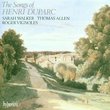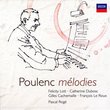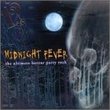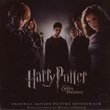| All Artists: Gabriel Faure, Gérard Souzay, Dalton Baldwin, Elly Ameling Title: Faure: Melodies/Lieder/Songs (complete) Members Wishing: 2 Total Copies: 0 Label: Brilliant Classics Release Date: 1/24/2006 Album Type: Box set Genres: Pop, Classical Styles: Vocal Pop, Chamber Music, Historical Periods, Baroque (c.1600-1750), Classical (c.1770-1830) Number of Discs: 4 SwapaCD Credits: 4 UPC: 675754884529 |
Search - Gabriel Faure, Gérard Souzay, Dalton Baldwin :: Faure: Melodies/Lieder/Songs (complete)
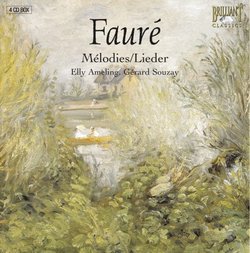 | Gabriel Faure, Gérard Souzay, Dalton Baldwin Faure: Melodies/Lieder/Songs (complete) Genres: Pop, Classical
|
Larger Image |
CD DetailsSimilar CDs
Similarly Requested CDs
|
CD ReviewsPARTED TONGUES DAVID BRYSON | Glossop Derbyshire England | 01/04/2007 (5 out of 5 stars) "Thank goodness my French is adequate enough for this set, because my Dutch most certainly is not. I should say at the outset that these four discs are a musical experience about as near perfection as any of us are likely to encounter in this imperfect human scene. However before I get round to my own song of praise let me point out some idiosyncrasies in the production. The French text of all the poems is provided in the leaflet without translation, and you can find the authors of the poems, the timings and the opus numbers of the songs on the reverse of the four envelopes containing the discs. I have not attempted to verify the accuracy of the latter information except that I happened to spot that two songs on the first disc appear as op5 no2, which I presume can't be right. The French texts are mainly accurate, and the dozen or so misprints that I noticed are trifles that any French-speaker will detect in an instant (plus two minor changes made by the singers). Occasionally the composer does not set the full text of this or that poem, and the editors have attempted to draw attention to this by means of square brackets and the digit `1', which refers us to a note (in English) `not set by Faure'. Thankyou kindly for that. However there are cases which the editors have not noticed at L'Aurore and Chant d'automne on the first disc, and the digit 1 with its message pop up inscrutably after Pleurs d'or on the third disc, referring to nothing that I can see. More significantly, in the one song with an English text, Melisande's Song on the third disc, the words are not given at all, and as luck would have it Ameling's English is not as distinct as her French, although further familiarity will presumably help. This number is apparently a translation of Maeterlinck by J W Mackail, well known to me from half a century ago as the author of a noddy-guide to Latin literature. What have these editors got against English? The liner note, which for all I know may be fine and illuminating, was originally in French, but as I have it here it is not in French, nor yet in English, but in Dutch. Perhaps not all copies are like this - ik hoppe. Of the 105 songs here, 101 are regular solos, one is a wordless vocalise, one is a duet for the two soloists, and two are duets for two sopranos. No credit is given to a second singer here, and I suspect that Ameling has been dubbed over herself. I imagine that the sequence in which they follow here is at least approximately their order of composition, and they give a fascinating picture of Faure's musical style as it developed, from the comparative simplicity of his earlier harmonic style to the unique and mandarin subtlety and refinement of his later. To get the best out of the set I would actually recommend anyone, unless he or she knows these songs thoroughly already, to play it through from start to finish without listening to any other music between times. That way, I find, the real stature, significance and originality of the later songs makes its full impression. The range of sentiments expressed in the poems and mirrored in the music is not very wide. The song that stands out as an exception is C'est la paix! on the last disc, referring I suppose to the end of WWI. Brahms wrote his terrific Triumphlied to celebrate the battle of Sedan, Handel turned out his colossal Te Deum for the comic-opera victory at Dettingen, but it takes a lot to get Faure to raise his urbane voice even to this extent. Even in this song as in all the others the tone is lyrical and thoughtful. Many of the poems are love-lyrics, but there is no erotic Wagnerian feel to the rapture however intense. Nature and the deity are invoked frequently, but I get no religious sense from the music which seems to me deeply humanist in tone. The amount of symbolism is enough to keep the literary criticism industry in business for a long time yet, I guess, and I don't see it as my own task in a short review to try to plumb the subtleties that any of us can sense from the outset in these wonderful songs, and for whose full comprehension one lifetime may not be enough. Faure was really an `absolute' musician in the sense that Bach, Chopin and Brahms were that. Even when he is composing to words, the only response he gives is the response that is best in purely musical terms. In a sense that makes his interpreters' task a little easier, but that is not to belittle what has been achieved here. The three artists have only one very unified and consistent style to master, but mastered it they have, and more than mastered. Quite apart from the musicianship, intelligence and sensitivity that they display without a hint of a lapse or of uncertainty from beginning to end, these are two of the most beautiful voices that the 20th century ever gave birth to. I have no `highlights' or any such vulgarity to point out, only a sublime consistency, reflecting the composer's own. The songs are all to much the same pattern, without word-repetition except when a certain verse is used as a refrain or the final phrase of a poem is repeated as an envoi. The singing is likewise all in much the same style, with a sense of power in reserve behind the lyric façade, but the tone unfailingly beguiling to the ear, and well served by the recording which applies (to my ears rightly) just a touch of `edging' of its own, as well as by the outstandingly beautiful work of Dalton Baldwin. Ca suffit. Now can we please have their Wolf Italian Songbook reissued?" A splendid bargain Ralph Moore | Bishop's Stortford, UK | 12/29/2009 (5 out of 5 stars) "There seems to have been two issues of this bargain box set: perhaps one is an import and the other for the Anglophone market, which would explain why the informative and helpful notes in my set are in English, not Dutch, and thus addresses one of the complaints in David Bryson's extensive review. Another Amazon.com reviewer complains about distortion on the high notes; I could hear nothing worse than some too-prominent hiss at the start of a couple of tracks featuring Souzay on disc 1 (track 12, for example) - perhaps this is, again, a function of which issue you buy. Mr Bryson also complains of some trifling errors in the French libretto provided. I didn't find many (perhaps the text in the newer issue has been corrected?); things like an "accent grave" instead of a "circonflexe" on "pôle", for example, hardly pain me, and I am more inclined to be grateful for the texts in a super-bargain set, especially as Fauré generally set Romantic, Imagist and Symbolist poets of quality and complexity, so the words are essential to our appreciation, regardless of your fluency in French. Nor did I have any quarrel with the way the notes indicate text not set by Fauré: there is a little error in the annotation of the text for the delightful duet "Pleurs d'or" but it is perfectly obvious that the last stanza is not set. This is indeed a wonderful bargain, available absurdly cheaply. While I would not want to be without Janet Baker's late (1988 - one of her last recordings) recital "La Chanson d'Eve" plus other songs, this 4 disc set is enough for anyone who wishes to enjoy the development of Fauré's art-songs over sixty years - and I seriously advise avoiding the Hyperion discs with Jennifer Smith and Stephen Varcoe singing poorly; this is far preferable, featuring two specialists in French mélodies. I had forgotten what a fine artist Elly Ameling is: she offers a limpid, pure, expressive soprano and excellent French diction. The two duets on Disc 3 where she sings with herself courtesy of over-dubbing are a special delight. I would modify Mr Bryson's rapture slightly by making a few observations about Souzay: certain songs I particularly like would have benefited by being given to Ameling instead, as at times he is already, by the early 1970's, a little dry and unsteady despite his nuanced artistry. I also confess to preferring the melodies of the "salon charmer" of the 1860's and 70's to the whispy, harmonic experimentalism of the late songs, some of which come, for my liking, a little too close in their gnomic pretentiousness to the stuff of Anna Russell's hilarious satire of the French chanson. But that's just my taste; perhaps I need to work harder at appreciating their typically Gallic elegance and subtlety. Meanwhile, I heartily recommend this box set; at this price you have nothing to lose and everything to gain by investing. I do not, however, advise trying to listen to these songs for more than half an hour at a sitting; sample them in order of composition, by all means, to appreciate the changes in Fauré's style, but do so sparingly, as they can start to sound samey. P.S. For the information of those British Amazon browsers who want to hear snippets, these are available only in the product descriptions on Amazon.com." Good work ruined 2496_Gourmet | 10/18/2009 (2 out of 5 stars) "These songs of Faure are amongst the most beautiful I know. To perform them, Elly Ameling and Gerard Souzay are the dream team.
Technically this recording is absolutely inadequate, as it shows a so called comb filter effect, that is a massive distortion of the high notes. They sound brittle and completely unnatural. I am an amateur sound engineer and I know how this kind of mistake is brought about. You have to adjust the delay of the singer's microphone in a wrong way, too short or too long. The average listener does not know about those things and is prone to attribute the distortions to the singer's voice, which happened to Danielle de Niese's Händel album lately. Poor Amelie, poor Danielle, you did not deserve such carelessness, as you both are divine. " |

 Track Listings (25) - Disc #1
Track Listings (25) - Disc #1
